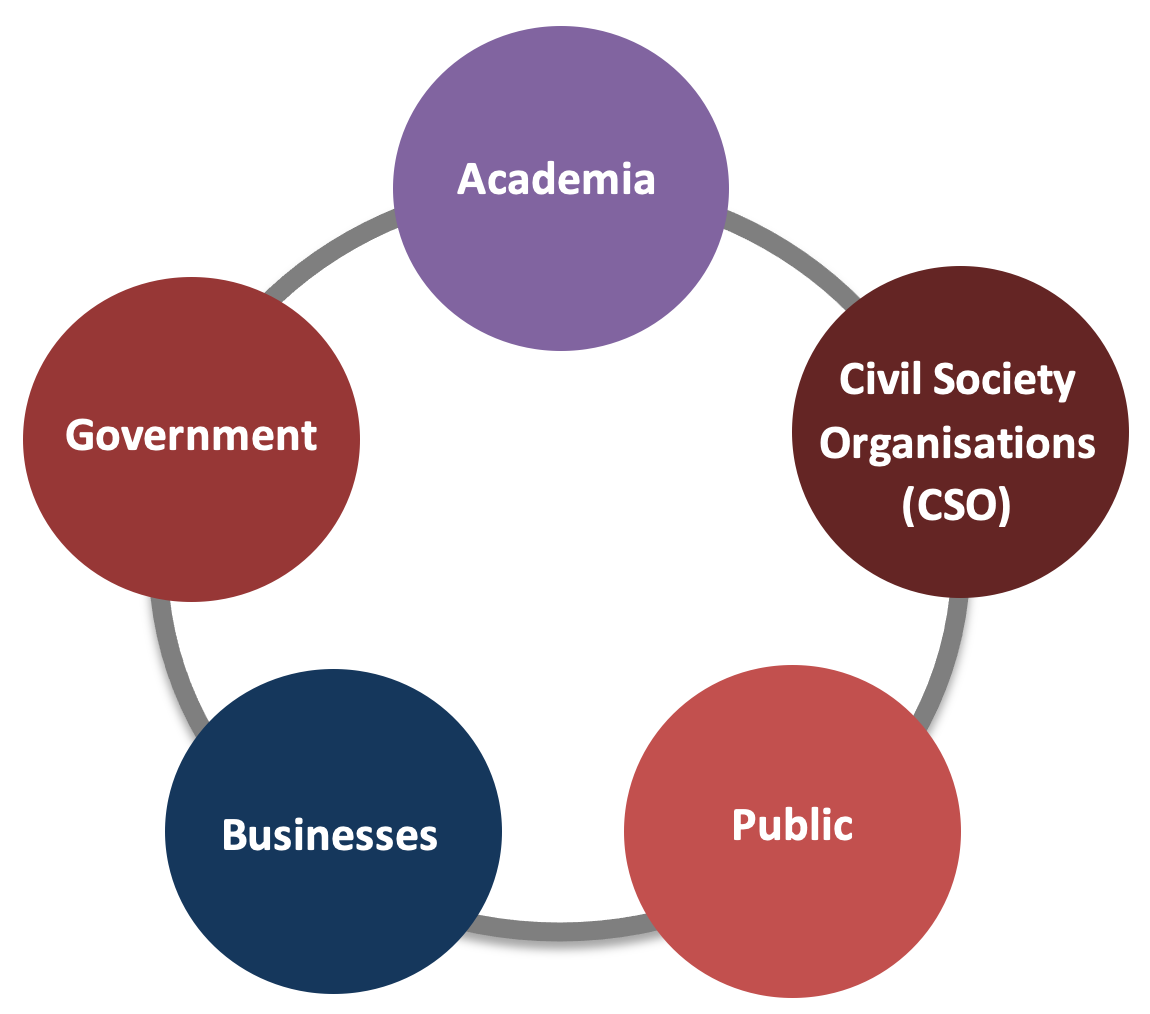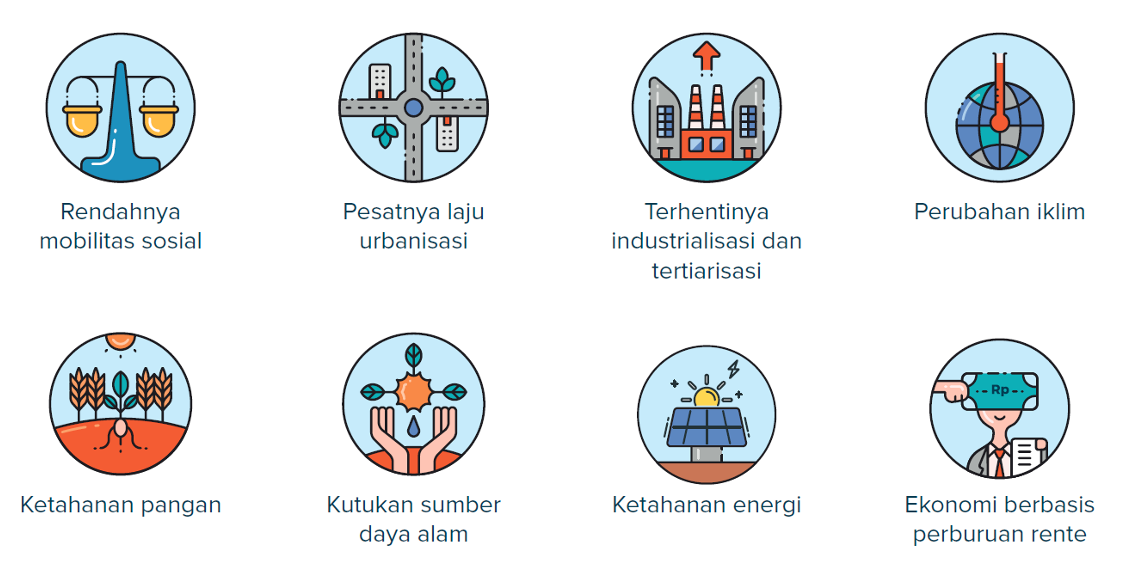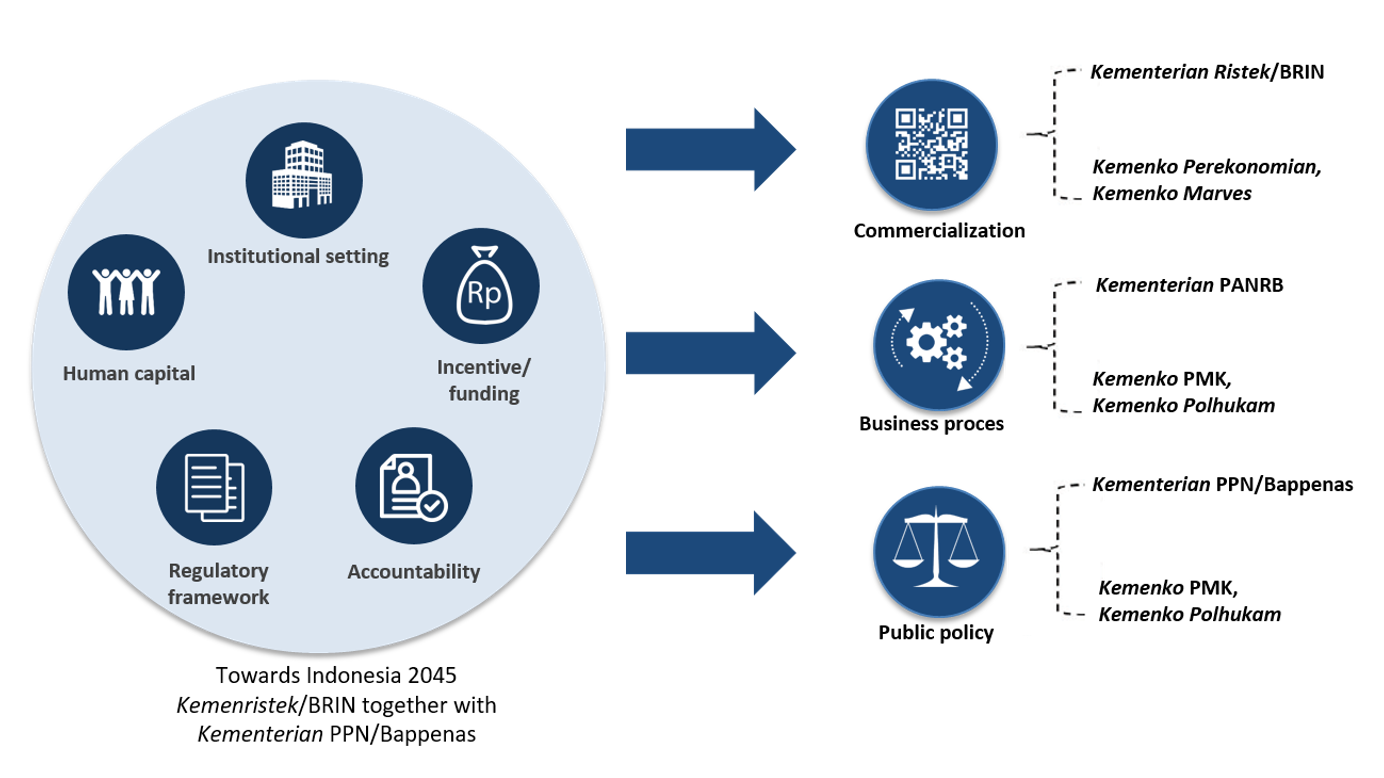In 2020, as a result of the COVID-19 pandemic, we have become more aware of the importance of strengthening the role of knowledge and innovation to ensure the nation’s readiness in facing development challenges and emerging issues. To realize the government’s 2045 Advanced Indonesia Vision of progress and prosperity there is no other way but to ensure that development is based on knowledge and innovation.
The Knowledge and Innovation Ecosystem Blueprint is, therefore, very timely as we are reminded that the economy must be built based on innovation and prosperity realized through knowledge-based policies.
Since 2012, the Knowledge Sector Initiative (KSI) program together with key stakeholders has worked to support changes and improve the knowledge ecosystem. By the program’s end in 2022, KSI seeks to ensure the sustainability of these changes and improvements, including through supporting the Indonesian Government in preparing the blueprint.
Build consensus, secure commitment

Figure 1. Actors in the Knowledge & Innovation Ecosystem
Since early discussions on the Knowledge and Innovation Ecosystem, it was recognized that a key aspect is ensuring that plans for change are implemented. This can only be achieved if all stakeholders share the same vision and have the commitment to achieve that vision together.
A series of ministerial-level discussions in the first half of 2020 determined that no road map or blueprint for operationalizing the advancement of the knowledge and innovation yet existed. These discussions produced a concept note regarding the knowledge and innovation ecosystem which would serve as the starting point for the preparation of the Blueprint.
Led by Bappenas, the initial consensus building process was crucial to ensure that as many knowledge and innovation actors as possible were involved in identifying what would be included in the KIE Blueprint document.
By the second half of 2020, a Blueprint Drafting Team was formed consisting of individuals with relevant competencies. For six months, the Drafting Team worked together with the Steering Committee and the Review Team that included echelon 1 and 2 representatives from three key ministries, namely Bappenas, Ministry of Research and Technology/National Agency for Research and Innovation (BRIN) and Ministry of Administrative and Bureaucratic Reform (PAN-RB). The Drafting Team held a series of consultations with representatives of the relevant ministries/agencies to ensure that the results were in line with the present government context, were inclusive, reflected the views of the various actors in the ecosystem, were grounded and can be operationalized.
The KIE Blueprint drafting in the second semester of 2020 involved consultations with ministers and echelon 2 officials from the relevant ministries and agencies. The drafting team led by Yanuar Nugroho conducted consultations with the Coordinating Minister for Economic Affairs, the Coordinating Minister for Human Development and Culture, the Coordinating Minister for Political, Legal and Security Affairs and the Coordinating Minister for Maritime Affairs and Investment, as well as the Minister of National Development Planning/Head of Bappenas, Minister of Research and Technology/Head of National Agency for Research and Innovation (BRIN) and Minister of Administrative and Bureaucratic Reform. A series of FGDs refined the proposed goals and strategies in the Blueprint and involved representatives from more than 30 agencies and organizations – both government and non-government.
Towards Advanced Indonesia 2045 Roadmap
In the remaining quarter of a century leading up to 2045, development challenges will become increasingly complex. For this reason, a key consensus in the preparation of the Blueprint was to adopt a mission-oriented, rather than a sector-based approach.

Figure 2 Eight Main Development Challenges
In addition to agreeing that the Knowledge and Innovation Ecosystem must be able to address development challenges through mission-oriented innovation, stakeholders also agreed on three main principles in implementing the Blueprint, concisting of: (1) innovation-based inclusive growth, (2) evidence-based public policy, and (3) cross-component issues – comprising gender equality and social inclusion, as well as regional/subnational perspectives.
Innovation-based inclusive growth embodies the idea of placing justice above growth that many economists have been advocating as of late, inspired by the increasing inequality in developed countries, including the United States. Experts agree that overcoming inequality is a prerequisite for achieving consistent economic growth through increased innovation.
The second key principle in promoting evidence-based policies is promoting the use of data for common purposes, including ensuring easy data access and harmonization. Principles related to cross-component issues are important in overcoming inequality, including between regions, and social groups, and inequality affecting women, people with disabilities, indigenous peoples, and rural communities – both within the knowledge and innovation ecosystem itself as well as the marginalized and minority groups as research subjects.
To strengthen Indonesia’s knowledge ecosystem, this Blueprint proposes five key targets:
1. Ensure a strong and clear regulatory framework
2. Fix institutional arrangements
3. Improve governance and accountability mechanisms
4. Develop dynamic resources, and
5. Provide adequate financial support and incentives.
Implementation based on synergy, not dichotomy

Figure 3 Proposed Mechanism for Implementing the Knowledge and Innovation Ecosystem Blueprint
A Blueprint will not be a very useful document if it is not implemented consistently. One reflection from the consultations and consensus building process is that there will always be tensions and a dichotomy between those who espouse views that innovation should be sought primarily for economic growth and those who argue that knowledge used to ensurethe creation of shared prosperity.
From this reflection, a multilateral approach to implementing the Blueprint is proposed to ensure that the KIE implementing coordinators (Ministry of Research and Technology/BRIN, Ministry of Administrative and Bureaucratic Reform, and Ministry of National Development Planning/Bappenas) involve:
(i) the relevant coordinating ministries,
(ii) other closely related ministries/agencies (e.g. Ministry of Finance and Ministry of Education and Culture), as well as
(iii) all actors in the KEI (producers, users, intermediaries, and knowledge enablers, both government and non-government, such as civil society organizations, media, academia, and donors) to ensure synchronization of planning and budgeting by the executing ministries/agencies.
Although the current Blueprint is a reference for the government to act as a good enabler for other actors, in the future, the Blueprint must become a living document that will continue to be enriched and further refined in terms of the roles of other actors.






